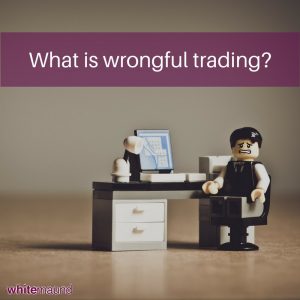What is wrongful trading?
Following the collapse of Carillion in what could be one of the largest insolvencies our profession has seen, the directors of the company have been ordered by the Work and Pensions and BEIS committees to give evidence as to why the company went into liquidation with liabilities estimated to be in excess of £1.5 billion. The Business Secretary has asked the Official Receiver to broaden and fast track investigations into the affairs of the company and specifically the conduct of its current and former directors. If it can be shown that the directors acted irresponsibly or in breach of their duties, the Official Receiver may be able to recover monies for the benefit of creditors in the liquidation.
Directors have an obligation to be fully aware of a company’s financial situation at all times. If a Director allows a firm to continue trading in a situation where a reasonably diligent person would realise that the firm’s insolvency is inevitable, they may be guilty of wrongful trading (trading with the knowledge of insolvency). There are two definitions of insolvency; the balance sheet definition (where the value of a company’s liabilities exceeds the value of its assets) and the cash flow definition of insolvency (where a company is unable to pay its liabilities as and when they fall due). It is the cash flow test that is perhaps more important as not paying debts as and when they fall due is likely to lead to recovery action being instigated particularly by HMRC.
Directors of a firm who know (or ought to have known as ignorance is no defence in this case) that its insolvency could not be avoided may be held personally liable if the company is subsequently liquidated. The Insolvency Act 1986 sets out two tests; the first is an objective test (did the director do everything a reasonable person would have done?) and a subjective test (given the director’s particular set of skills and experience, did he or she do everything one would expect of a person with those skills and experience?).
If a company is or is likely to become insolvent, it is essential that the directors take early advice. Continuing to trade with the knowledge of insolvency is possible and providing the directors believe that there is a bona fide reason for trading on (such as winning a contract or entering a seasonal busy period) and believe the position for creditors will not worsen, claims for wrongful trading may be mitigated. We would always recommend that the directors write down their reasons for making the decision to continue trading so that if they are subsequently challenged they have a record. The directors should also ensure they have robust financial information such as a cash flow forecast and ensure that they regularly monitor actual performance against forecasts.
If there is a sustainable core business, it may be appropriate to consider proposing a Company Voluntary Arrangement or putting the company into administration.
If directors trade on with no real plan, the financial situation deteriorates and the company subsequently enters liquidation, a liquidator may seek to make a claim against the directors for wrongful trading. If the claim is successful, the directors may be ordered to make such a contribution to the assets of the company as the Court sees fit. If it can be shown that the directors traded on with the intention of defrauding creditors, this is a much more serious charge and can give rise not only to a financial penalty but also a criminal conviction.
Any instances of wrongful trading are likely to be included in a liquidator’s report to the Insolvency Service and may result in a director being disqualified for a period of between 2 and 15 years.
As mentioned above, taking early advice is paramount to ensure directors are aware of the risks and how they can minimise their potential liability. If you would like advice on finding the best solutions for you please call 01273 731144 or use the contact form below.
